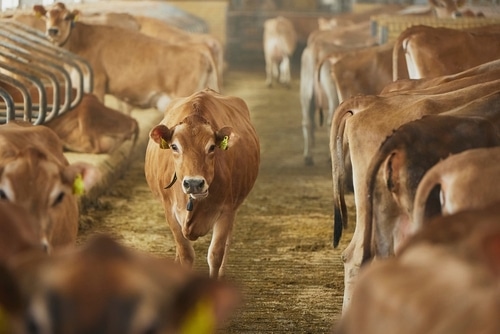You’ve probably heard about the rising demand for sustainable dairy products. But did you know that Jersey cattle are leading the charge in Lancashire’s dairy industry? These medium-sized cows are transforming local farms with their efficiency, high-quality milk and eco-friendly attributes.
Here’s why farmers are embracing Jersey cows and how they’re revolutionising sustainable dairy production in the region and around the world.
The rise of Jersey cattle in Lancashire
Lancashire’s dairy farmers are facing new challenges in the 21st century. With increasing pressure to produce more milk while reducing environmental impact, many are turning to Jersey cattle as a solution. These gentle, fawn-coloured cows are proving to be game-changers in the world of sustainable dairy farming.
Jersey cows have been around for centuries, but they’re experiencing a renaissance in Lancashire. Farmers are discovering that these compact bovines pack a powerful punch when it comes to milk production and efficiency. And it’s not just about quantity – the quality of Jersey milk is second to none.
The Jersey advantage: More than just a pretty face
So, what makes Jersey cattle so special? Well, for starters, they’re incredibly efficient milk producers. Despite their smaller size, Jerseys can convert feed into milk like nobody’s business. This means farmers can produce more milk with fewer resources, which is a win-win for both the environment and the bottom line.
But it’s not just about efficiency. Jersey milk is known for its high butterfat and protein content, making it perfect for producing premium dairy products like cheese and butter. This rich, creamy milk is in high demand among consumers who are willing to pay a premium for quality.
Health and longevity: The Jersey secret
One of the biggest advantages of Jersey cattle is their overall health and longevity. These cows are known for their hardiness and resistance to common dairy cow ailments. This means fewer vet bills and less stress for farmers.
Plus, Jerseys tend to have a longer productive life than some other breeds, which translates to more sustainable farming practices. Their natural calving ease and strong maternal instincts also contribute to better herd health, reducing the need for human intervention and associated costs. This combination of traits makes Jerseys an ideal choice for farmers looking to improve their herd’s overall well-being and productivity.
Environmental impact: Jersey cows as eco-warriors
When it comes to sustainability, Jersey cows are leading the pack. Their smaller size means they require less feed and produce less waste than larger breeds. This translates to a reduced carbon footprint for dairy farms. Additionally, Jerseys are well-suited to grazing on pasture, which can help improve soil health and biodiversity on farms.
Their efficient feed conversion also means they produce more milk per unit of feed consumed, further enhancing their environmental credentials. Farmers have noted that Jerseys’ lower body weight results in less soil compaction, contributing to better pasture management and reduced erosion.
The economic boost: How Jerseys are helping Lancashire farmers thrive
The adoption of Jersey cattle is having a positive impact on Lancashire’s rural economy. Farmers who have made the switch are reporting increased profitability due to lower input costs and higher milk prices. This economic boost is helping to keep small family farms viable in an increasingly competitive industry.
The versatility of Jersey milk also allows farmers to diversify their product range, tapping into niche markets for premium dairy products. This diversification not only increases revenue streams but also provides a buffer against market fluctuations, enhancing the overall financial stability of Lancashire’s dairy farms.
Consumer demand: The Jersey milk revolution
It’s not just farmers who are falling in love with Jersey cows. Consumers are increasingly seeking out Jersey milk and dairy products for their rich flavour and nutritional benefits. This growing demand is creating new opportunities for Lancashire dairy farmers to market their products and command premium prices.
The creamy texture and higher butterfat content of Jersey milk make it particularly popular for speciality cheeses and artisanal dairy products. Health-conscious consumers also appreciate the higher protein and calcium content, driving demand for Jersey milk in health food stores and fitness-oriented cafes across Lancashire.
The future of dairy farming in Lancashire
As more farmers in Lancashire embrace Jersey cattle, the region is positioning itself as a leader in sustainable dairy production. This shift is not only benefiting individual farms but also contributing to the overall health of the local environment and economy.
The Jersey cattle revolution in Lancashire is just getting started. With their efficiency, high-quality milk and eco-friendly attributes, these cows are proving that sustainable dairy farming can be both profitable and environmentally responsible.
As consumers continue to demand more sustainable and high-quality dairy products, Jersey cows are likely to play an increasingly important role in shaping the future of Lancashire’s dairy industry.





